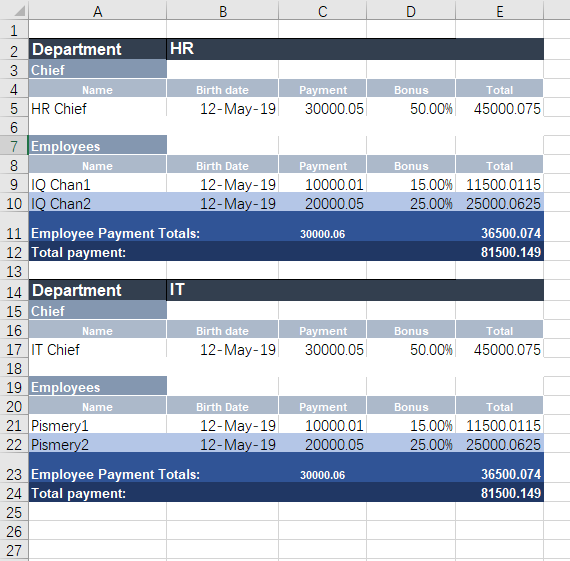TOC
JXLS
JXLS 是 Java 导出 Excel 的一个工具包,尽管 POI 工具包已经可以满足所有的需求,但是有时候操作还是比较复杂,且有一定的代码量,而 JXLS 在生成 Excel 方面显得更加方便好用;下面开始介绍 JXLS 工具包
基本介绍:
- 可以通过 Java 或 Excel 批注的方式编写指令;
- 在 Excel 的第一个单元格需要指定模板范围;
- 单元格可通过 ${} 方式获取上下文对象的值;
- 指令中可通过 “” 方式获取上下文;
指令介绍
JXLS 中其采用了 Apache JEXL 指令表达式,下面介绍一些常用的指令;
jx:each 循环
jx:each(items="employees" var="employee" lastCell="D4" area="[A4,D4]" select="employee.payment > 2000")
参数介绍
| 参数名称 | 示例 | 介绍 |
|---|---|---|
| items | items=“employees” | 表示遍历上下文中的集合对象 employees |
| var | var=“employee” | 表示遍历值设为 employee,在遍历区域可以通过 ${employee} 方式访问 |
| lastCell | lastCell=“D4” | 表示指令的结束位置 |
| direaction | direction =“RIGHT” | 输出的方向向下(DOWN)或向右(RIGHT),默认为DOWN |
| area | areas=[“A8:F8”,“A13:F13”] | 循环的区域,多个可用 「,」 分隔 |
| select | select=“employee.payment > 2000” | 过滤条件 |
| groupBy | groupBy=“name” | 依据 employee 中 name 进行分组,分组后的集合可通过 nameGroup.items 来获取; |
| groupOrder | groupOrder=“asc” | 指定分组排序(‘desc’ or ‘asc’) |
| multisheet | multisheet =“sheets” | 循环上下文中的 sheets 对象,指定后会产生多个 sheet,指定后 each 的维度会变为 sheet,不需要指定 area; |
| shiftMode | shiftMode =“adjacent” | adjacent 指定后通过添加行的方式向指定方向输出,inner: 则为通过添加单元格的方式向指定方向输出,默认为inner; |
jx:if 条件判断
jx:if(condition="employee.payment <= 20000", lastCell="E9", areas=["A9:E9","A18:E18"])
参数介绍
| 参数名称 | 示例 | 介绍 |
|---|---|---|
| condition | condition=“employee.payment <= 20000” | if 条件判断表达式 |
| lastCell | lastCell=“E9” | 指令结束位置 |
| areas | areas=[“A9:E9”,“A18:E18”] | 如果为 true 使用 A9:E9 单元格模板渲染,反之使用 A18:E18; |
jx:updateCell 动态输出公式
jx:updateCell(lastCell="E4" updater="totalCellUpdater")
参数介绍
| 参数名称 | 示例 | 介绍 |
|---|---|---|
| updater | updater=“totalCellUpdater” | totalCellUpdater 是上下文中的一个对象,并且该对象必须实现 CellDataUpdater 接口 |
示例
static class TotalCellUpdater implements CellDataUpdater{
/**
* cellData 批注对应的单元格
* targetCell 输出的单元格
* context 模板中的上下文通过getVar(变量名)来获取传入的对象
*/
@Override
public void updateCellData(CellData cellData, CellRef targetCell, Context context) {
if( cellData.isFormulaCell() && cellData.getFormula().equals("SUM(E2)")){
String resultFormula = String.format("SUM(E2:E%d)", targetCell.getRow());
cellData.setEvaluationResult(resultFormula);
}
}
}
jx:grid 输出一个表格
jx:grid(lastCell="A4" headers="headers" data="data" areas=[A3:A3, A4:A4]
参数介绍
| 参数名称 | 示例 | 介绍 |
|---|---|---|
| headers | headers=“headers” | 循环的表头内容为List ,表头和表体没有必然的关系,可以多一列也可以少一列 |
| data | data=“datas” | 循环的表体内容为List
|
| formatCells | formatCells=“BigDecimal:C1,Date:D1” | 表示 BigDecimal 采用 C1 单元格方式渲染,Date 类型使用 D1 单元格方式渲染 |
Java 示例
try(InputStream is = GridCommandDemo.class.getResourceAsStream("grid_template.xls")) {
try(OutputStream os = new FileOutputStream("grid_output2.xls")) {
Context context = new Context();
context.putVar("headers", Arrays.asList("Name", "Birthday", "Payment"));
context.putVar("data", employees);
//当循环的表体为javabean时指定读取的属性,Sheet2!A1表示输出开始的位置
JxlsHelper.getInstance().processGridTemplateAtCell(is, os, context, "name,birthDate,payment,bonus", "Sheet2!A1");
}
}
完整示例
下面展示两种常用的使用方式,更多的使用 Demo 可参考官方 Demo 仓库
Maven
<dependency>
<groupId>org.jxls</groupId>
<artifactId>jxls</artifactId>
<version>2.6.0</version>
</dependency>
<dependency>
<groupId>org.jxls</groupId>
<artifactId>jxls-poi</artifactId>
<version>1.2.0</version>
</dependency>
<dependency>
<groupId>org.jxls</groupId>
<artifactId>jxls-jexcel</artifactId>
<version>1.0.9</version>
</dependency>
Model Bean
@Data
@Builder
@NoArgsConstructor
@AllArgsConstructor
public class Department {
private String name;
private Employee chief;
private List<Employee> staff = new ArrayList<>();
private String link;
}
@Data
@Builder
@NoArgsConstructor
@AllArgsConstructor
public class Employee {
private String name;
private Integer years;
private Date birthDate;
private BigDecimal payment;
private BigDecimal bonus;
}
Grid Demo
Excel 模板

Java
public class JXLSUtil {
public static final String TEMPLATE_PATH = System.getProperty("user.dir") + "/src/main/resources/template/";
public static final String REPORT_PATH = System.getProperty("user.dir") + "/src/main/resources/report/";
public static void generateTableExcel(List<Employee> data) throws IOException {
List<String> headers = Arrays.asList("Name", "BirthDate", "Payment", "Bonus");
String objectProps = "name,birthDate,payment,bonus";
try (InputStream is = new FileInputStream(new File(TEMPLATE_PATH, "simple_exporter_template.xlsx"))) {
try (OutputStream os = new FileOutputStream(new File(REPORT_PATH,"simple_exporter_report.xlsx"))) {
SimpleExporter simpleExporter = new SimpleExporter();
simpleExporter.registerGridTemplate(is);
simpleExporter.gridExport(headers, data, objectProps, os);
}
}
}
}
public class JXLSUtilTest {
@Test
public void generateTableExcel() throws IOException {
//Given
List<Employee> staff = Arrays.asList(
buildEmployee("IQ Chan1", new Date(), new BigDecimal(10000.01), new BigDecimal(0.15)),
buildEmployee("IQ Chan2", new Date(), new BigDecimal(20000.05), new BigDecimal(0.25))
);
//When
JXLSUtil.generateTableExcel(staff);
//Then
}
private static Employee buildEmployee(String name, Date birthdate, BigDecimal payment, BigDecimal bonus) {
return Employee.builder()
.name(name)
.birthDate(birthdate)
.years(1)
.payment(payment)
.bonus(bonus)
.build();
}
}
运行结果

Each and IF 指令示例
Excel 模板

Java
public class JXLSUtil {
public static final String TEMPLATE_PATH = System.getProperty("user.dir") + "/src/main/resources/template/";
public static final String REPORT_PATH = System.getProperty("user.dir") + "/src/main/resources/report/";
public static void generateExcel(Map<String, Object> model, String templateName, String reportName) throws IOException {
try (InputStream is = new FileInputStream(new File(TEMPLATE_PATH, templateName))) {
File reportPath = new File(REPORT_PATH);
if (!reportPath.exists())
reportPath.mkdir();
try (OutputStream os = new FileOutputStream(new File(REPORT_PATH, reportName))) {
Context ctx = new Context();
model.forEach(ctx::putVar);
JxlsHelper.getInstance().processTemplate(is, os, ctx);
}
}
}
}
public class JXLSUtilTest {
@Test
public void generateExcel_each_if_command() throws IOException {
//Given
List<Employee> hrStaff = getStaffList("IQ Chan1", "IQ Chan2");
List<Employee> itStaff = getStaffList("Pismery1", "Pismery2");
Employee hr_chief = buildEmployee("HR Chief", new Date(), new BigDecimal(30000.05), new BigDecimal(0.5));
Employee it_chief = buildEmployee("IT Chief", new Date(), new BigDecimal(30000.05), new BigDecimal(0.5));
List<Department> departmentList = Arrays.asList(
buildDepartment("HR", hr_chief, "HR Link", hrStaff),
buildDepartment("IT", it_chief, "IT Link", itStaff)
);
Map<String, Object> model = new HashMap<>();
model.put("departments", departmentList);
model.put("employees", hrStaff);
//When
JXLSUtil.generateExcel(model, "each_if_demo_template.xlsx","each_if_demo_report.xlsx");
//Then
}
@NotNull
private List<Employee> getStaffList(String staff1, String staff2) {
return Arrays.asList(
buildEmployee(staff1, new Date(), new BigDecimal(10000.01), new BigDecimal(0.15)),
buildEmployee(staff2, new Date(), new BigDecimal(20000.05), new BigDecimal(0.25))
);
}
private static Employee buildEmployee(String name, Date birthdate, BigDecimal payment, BigDecimal bonus) {
return Employee.builder()
.name(name)
.birthDate(birthdate)
.years(1)
.payment(payment)
.bonus(bonus)
.build();
}
private static Department buildDepartment(String name, Employee chief, String link, List<Employee> staff) {
return Department.builder()
.name(name)
.chief(chief)
.link(link)
.staff(staff)
.build();
}
}
运行结果
